新概念英语语法:状语从句表格
新概念英语第三册九大状语从句课件
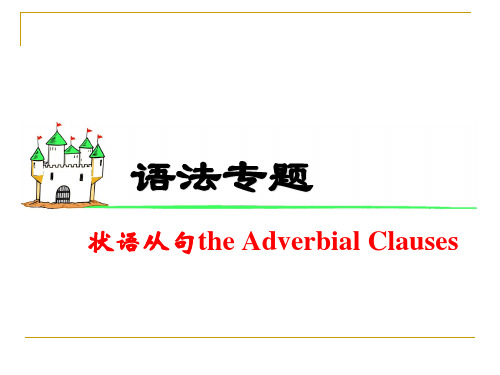
D. while
7.
____A__ I accept that he is not perfect, I do actually
like the person.
A. While B. Since
C. Before D. Unless
8. ___C_____it is true that a student’s most important goal is to do well
in his or her studies, it doesn’t need to be the only goal. A when B As C While D Before
9. Mary made coffee
C her guests were finishing their
meal.
A. so that
everything except gardening.
④ I was wandering through the street___w_h_e_n___ I
caught sight of a tailor’s shop.
⑤ __W__h_i_le___ the grandparents love the children,
A. why
B. where C. when D. while
连接词while的用法小结
1. while可用来引导时间状语,意为“当……的时候”; 引导的动作必须是持续性的,如:
Please don’t talk so loud while others are working. 2. while作为并列连词,意为“而,却”,表示两者对比。
own son.
( 方式 )
(完整版)新概念2语法分布表
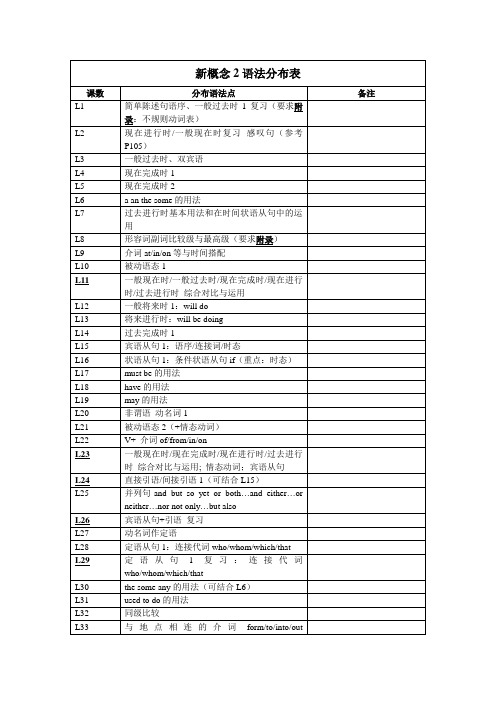
虚拟语气:用在宾语从句中
L88
虚拟语气3:if从句综合
Hale Waihona Puke L89虚拟语气:情态动词have done
L90
主谓一致
L91
分词作宾语补足语
L92
动名词主动表示被动
L93
非限制性定语从句
L94
动词不定式做宾语补足语
L95
动名词与动词不定式做宾语的含义不同
L96
for表示因为
L17
must be的用法
L18
have的用法
L19
may的用法
L20
非谓语动名词1
L21
被动语态2(+情态动词)
L22
V+介词of/from/in/on
L23
一般现在时/现在完成时/现在进行时/过去进行时综合对比与运用;情态动词;宾语从句
L24
直接引语/间接引语1(可结合L15)
L25
并列句and but so yet or both…and either…or neither…nor not only…but also
L26
宾语从句+引语复习
L27
动名词作定语
L28
定语从句1:连接代词who/whom/which/that
L29
定语从句1复习:连接代词who/whom/which/that
L30
the some any的用法(可结合L6)
L31
used to do的用法
L32
同级比较
L33
与地点相连的介词form/to/into/outof/for/towards/at
L41
must have to need的用法
L29 时间状语从句的使用--新概念英语英语2讲义

L29-NCE2 L60||占卜未来||The future一、本课语法目标:时间状语从句二、课文精讲:1.At a village fair, I decided to visit a fortune-teller ... I went into her tent and she told me to sit down.(1)decide to do sth.: 决定做某事= make up one's mind to do sth.(2)At a village fair, I made up my mind to visit a fortune-teller …2.After I had given her some money, she … said: 'a relation of yours is coming to see you ...relation: n. 亲戚a relation of yours →双重所有格a friend of my father's (Not for jazz)…a relation of yours is coming to see you …现在进行时表示为将来安排好的活动或事件3.She will be arriving this evening and intends to stay for a few days.(1)will be doing 可用来表示对将来的预测(口语常用)After you take the medicine, you will be feeling much better.服药之后,你会感觉好得多。
(2)intend to do = plan to do: 打算做某事That's what I intend to do: stand on your side and fight for your future.…That's what I intend to do as president of the United States of America.4.The moment you leave this tent, you will get a big surprise. A woman you know well will rush towards you …(1)the moment = as soon as: 引导时间状语从句As soon as you leave this tent, you will get a big surprise.(2)A woman (whom / that) you know well will rush towards you.关系代词whom / that做从句中动词know的直接宾语,可以省略It is one of the ugliest faces (that) I have ever seen.—No parking5.…She will speak to you and then she will lead you away from this place. That is all.'预测:(1)a relation of yours is coming to see you(2)She will be arriving this evening and intends to stay for a few days.(3)The moment you leave this tent, you will get a big surprise. A woman you know well will rush torwards you (4)She will speak to you and then she will lead you away from this place.that is all:就这些;当作一个语块来记忆,常常用来作为结束语。
新概念英语第二册语法总结:状语从句
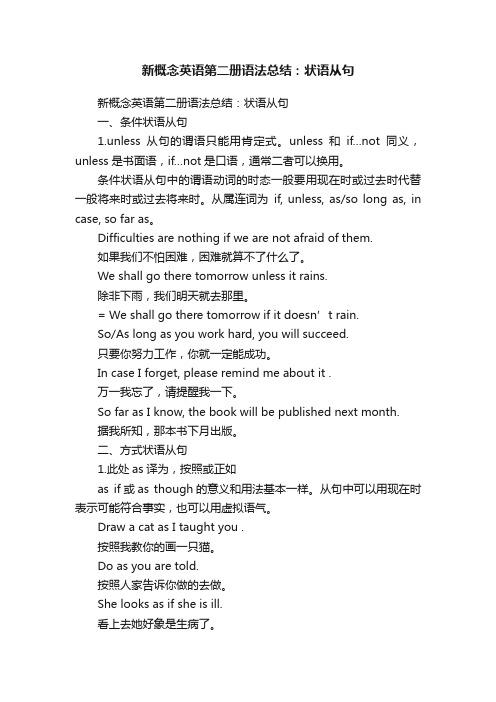
新概念英语第二册语法总结:状语从句新概念英语第二册语法总结:状语从句一、条件状语从句1.unless从句的谓语只能用肯定式。
unless和if…not同义,unless是书面语,if…not是口语,通常二者可以换用。
条件状语从句中的谓语动词的时态一般要用现在时或过去时代替一般将来时或过去将来时。
从属连词为if, unless, as/so long as, in case, so far as。
Difficulties are nothing if we are not afraid of them.如果我们不怕困难,困难就算不了什么了。
We shall go there tomorrow unless it rains.除非下雨,我们明天就去那里。
= We shall go there tomorrow if it doesn’t rain.So/As long as you work hard, you will succeed.只要你努力工作,你就一定能成功。
In case I forget, please remind me about it .万一我忘了,请提醒我一下。
So far as I know, the book will be published next month.据我所知,那本书下月出版。
二、方式状语从句1.此处as译为,按照或正如as if或as though的意义和用法基本一样。
从句中可以用现在时表示可能符合事实,也可以用虚拟语气。
Draw a cat as I taught you .按照我教你的画一只猫。
Do as you are told.按照人家告诉你做的去做。
She looks as if she is ill.看上去她好象是生病了。
He acted as if (though) nothing had happened.他的行动就好象什么也没有发生。
They treat the black boy as if (though) he were an animal.他们对待这黑孩子仿佛他是一头牲口。
新概念2语法分布表
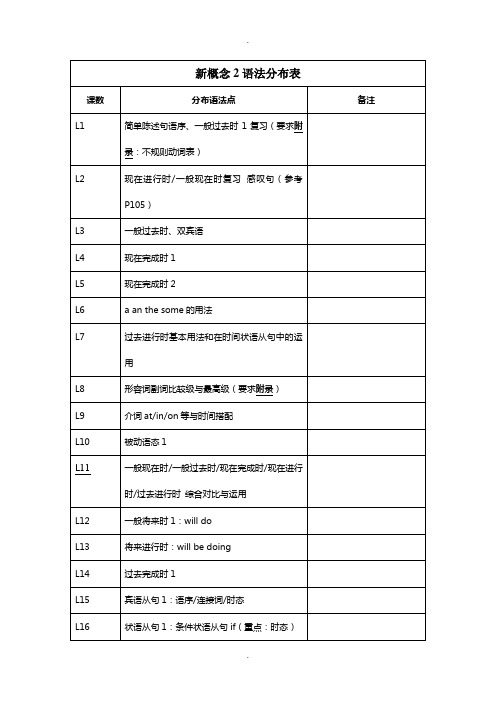
带有动词不定式的被动语态3 &双宾语的被动语态
L35
状语从句2:结果状语从句 一般过去时与过去进行时复习
L36
一般将来时2:be going to do
L37
将来完成时
L38
过去完成时复习(可结合L14) “一…就…”句型
L39
直接引语/间接引语2(可结合L15/L24)
L40
虚拟语气1:if从句对于现在的虚拟
L41
must have to need的用法
L42
have的用法have a walk=walk; 状语从句3:时间状语从句as、as soon as、when
L43
can V.S. be able to do
L44
动名词与动词不定式作宾语意思相同 如begin to do=begin doing
新概念2语法分布表
课数
分布语法点
备注
L1
简单陈述句语序、一般过去时1复习(要求附录:不规则动词表)
L2
现在进行时/一般现在时复习 感叹句(参考P105)
L3
一般过去时、双宾语
L4
现在完成时1
L5
现在完成时2
L6
a an the some的用法
L7
过去进行时基本用法和在时间状语从句中的运用
L8
形容词副词比较级与最高级(要求附录)
L62
过去完成时 V.S. 过去完成进行时
L63
间接引语3
L64
虚拟语气2:if从句对于过去的虚拟
L65
现在分词作状语
L66
have sth done 找人来做某事
L67
manage to do; until的用法;不定式做宾语
新概念英语语法表:简单句与并列句,复合句
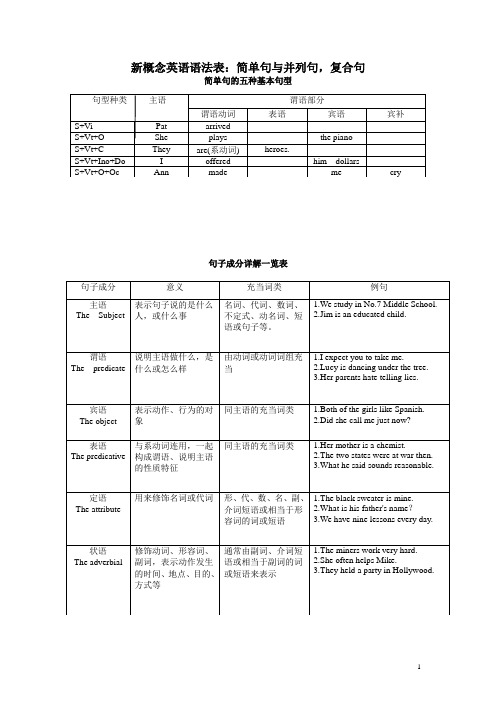
新概念英语语法表:简单句与并列句,复合句简单句的五种基本句型句子成分详解一览表句型种类 主语谓语部分谓语动词 表语 宾语 宾补 S+Vi Pat arrived S+Vt+O She plays the pianoS+Vt+CThey are(系动词) heroes.S+Vt+Ino+Do I offered him dollarsS+Vt+O+Oc Annmademecry句子成分意义充当词类 例句主语 The Subject 表示句子说的是什么人,或什么事名词、代词、数词、不定式、动名词、短语或句子等。
1.We study in No.7 Middle School. 2.Jim is an educated child.谓语 The predicate 说明主语做什么,是什么或怎么样由动词或动词词组充当1.I expect you to take me.2.Lucy is dancing under the tree.3.Her parents hate telling lies.宾语 The object 表示动作、行为的对象同主语的充当词类1.Both of the girls like Spanish.2.Did she call me just now? 表语 The predicative 与系动词连用,一起构成谓语、说明主语的性质特征同主语的充当词类1.Her mother is a chemist.2.The two states were at war then.3.What he said sounds reasonable.定语 The attribute 用来修饰名词或代词 形、代、数、名、副、介词短语或相当于形容词的词或短语 1.The black sweater is mine. 2.What is his father's name ?3.We have nine lessons every day. 状语The adverbial修饰动词、形容词、副词,表示动作发生的时间、地点、目的、方式等通常由副词、介词短语或相当于副词的词或短语来表示 1.The miners work very hard. 2.She often helps Mike.3.They held a party in Hollywood.句子分类一览表宾语补足语 The object complement宾语的补足语,逻辑上与宾语是“主谓”关系一般由形容词、名词、介词短语等充当1.They named the baby Lily.2.She always keeps the house clean every day.分类 说明例句按结构分类简单句 The simple sentence由一个主语(或并列主语)和一个谓语(或并列谓语)构成的句子。
新概念英语第二册语法总结:状语从句(上)

新概念英语第二册语法总结:状语从句(上)一、时间状语从句1.when指的是“某一具体的时间”。
whenever指的是“在任何一个不具体的时间”。
When I came into the room, he was writing a letter.当我进屋时,他正在写信。
We shall go there whenever we are free.我们什么时间有空,我们就去那里。
2.when意为“这时”或“在那个时候”,可以看作是并列句,这种用法的when分句一般位于句末。
I was walking along the street when suddenly someone patted me on the shoulder from behind.我正在街上走着,这时忽然有人从后面拍我的肩膀。
3.while指“在某一段时间里”,“在……期间”,while引导的动作必须是持续性的。
While it was raining, they went out.天下雨的时候,他们出去了。
I stayed while he was away.他不在的时候我在。
4.as引导持续性动作,强调主句和从句的动作同时发生。
He hurried home, looking behind as he went.他赶快回家,不时地一边走一边向后看。
5.before译为在……之前Be a pupil before you become a teacher.先做学生,再做先生。
6.after译为在……之后He arrived after the game started.比赛开始后,他到了。
7.如主句动词是持续性动作,常用肯定式,表示“直到……为止”。
从属连词为till/untilWe waited till (until) he came back .我们一直等到他回来。
8.如主句动词是瞬间动词,常用否定式,表示“直……才”“在……以前不”,从句放在句首表示强调,一般用untilShe didn’t stop working until eleven o’clock.她到11点钟才停止工作。
新概念英语第二册语法总结:状语从句(上)

新概念英语第二册语法总结:状语从句(上)知识要点状语从句是副词性从句,它在句子中担任状语,修饰主句的动词、形容词或副词。
根据修饰的方面,状语从句能够分为以下九种:时间状语从句、地点状语从句、原因状语从句、目的状语从句、结果状语从句、条件状语从句、方式状语从句、让步状语从句和比较状语从句。
一、时间状语从句1.when指的是“某一具体的时间”。
whenever指的是“在任何一个不具体的时间”。
When I came into the room, he was writing a letter.当我进屋时,他正在写信。
We shall go there whenever we are free.我们什么时间有空,我们就去那里。
2.when意为“这时”或“在那个时候”,能够看作是并列句,这种用法的when分句一般位于句末。
I was walking along the street when suddenly someonepatted me on the shoulder from behind.我正在街上走着,这时忽然有人从后面拍我的肩膀。
3.while指“在某一段时间里”,“在……期间”,while引导的动作必须是持续性的。
While it was raining, they went out.天下雨的时候,他们出去了。
I stayed while he was away.他不在的时候我在。
4.as引导持续性动作,强调主句和从句的动作同时发生。
He hurried home, looking behind as he went.他赶快回家,不时地一边走一边向后看。
5.before译为在……之前Be a pupil before you become a teacher.先做学生,再做先生。
6.after译为在……之后He arrived after the game started.比赛开始后,他到了。
- 1、下载文档前请自行甄别文档内容的完整性,平台不提供额外的编辑、内容补充、找答案等附加服务。
- 2、"仅部分预览"的文档,不可在线预览部分如存在完整性等问题,可反馈申请退款(可完整预览的文档不适用该条件!)。
- 3、如文档侵犯您的权益,请联系客服反馈,我们会尽快为您处理(人工客服工作时间:9:00-18:30)。
状语从句指句子用作状语时,起副词作用的句子。
它可以修饰谓语、非谓语动词、定语、状语或整个句子。
根据其作用可分为时间、地点、原因、条件、目的、结果、让步、方式和比较等从句。
状语从句一般由连词(从属连词)引导,也可以由词组引起。
种类从属连词例句说明时间状语从句whenwheneverWhen I came into the room, he was writing a letter.当我进屋时,他正在写信。
We shall go there whenever we are free.我们什么时间有空,我们就去那里。
when指的是“某一具体的时间”。
whenever指的是“在任何一个不具体的时间”。
whenI went to Beijing when I was five years old.It was foolish of you to take a taxi when you couldeasily walk there in five minutes.I was walking along the street when suddenlysomeone patted me on the shoulder from behind.I had just gone to bed when the telephone rang.We were about to start when it began to rain.We were on the point of giving up when a truck cameinto our sight.当…时候when引导的从句动词短暂性,延续性皆可。
when可表示原因,既然,相当于sincewhen可意为“这时”或“在那个时候”,表突然含义,可以看作是并列句,这种用法的when分句一般位于句末。
when的常见句型:was/were doing …when;正在做某事的时候突然had done … when;刚做完某事时突然be about to do…when;正要做某事时突然be on the point of doing…when;正要做某事时突然while While it was raining, they went out.天下雨的时候,他们出去了。
Mum was cooking while Dad was watching TV.while指“在某一段时间里”,“在…期间”,while引导的动作必须是持续性的。
(while可以表示而,却,表对比之意,此时为并列连词)as He hurried home, looking behind as he went.他赶快回家,不时地一边走一边向后看。
as引导持续性动作,强调主句和从句的动作同时发生。
(译成:一边…一边)as +n. 相当于一个时间状语从句As a boy= when he was a boybefore Be a pupil before you become a teacher.Before I could get in a word ,he had measuredme.我还没来得及插话,他就给我量好了尺寸。
It will be 4 years before he graduates.他还有四年时间毕业了。
We had sailed four days and four nights before wesaw land. 我们航行了四天四夜才见到陆地。
We hadn’t run a mile before he felt tired.我们还没走到一英里路他就觉得累了。
It wasn’t two years before he left the country. 还没到两年他们离开了那国家。
I hope to see you before long.I saw the film long beforebefore译为在…之前,before sb can/could… 某人还没来得及…It will be +时间+ before还有多长时间……had done … before(才……)had not done … before…不到…就…It was not+一段时间+before 不多久就……before long不久以后long before很久以前,after He arrived after the game started.比赛开始后,他到了。
在…之后till We waited till (until)he came back .我们一直等到他回来。
如主句动词是持续性动作,常用肯定式,表示“直到…为止”until She didn’t stop working until eleven o’clock .她到11点钟才停止工作。
如主句动词是瞬间动词,常用否定式,表示“直…才”“在…以前不”,从句放在句首Until he had passed out of sight, she stood there.她站在那里看着,直到看不见他的身影。
It was not until eleven o’clock that she stopped working. 表示强调,一般用untilnot… until 用于强调句,注意否定转移It is not until… thatsince ever since Great changes have taken place in China since 1978.自从1978年以来中国发生了巨大的变化。
It is 5 years since I joined the party.(join为短暂性动词)从那时到现在It is/ has been + 时间段since +一般过去时.此句型为短暂性动词可以和时间段连用的特殊句型。
时间的计算一律从since从句的动作完成或状态结束时算起。
as soon as (once=directly=im mediately=instantly)As soon as I arrive in Shanghai, I’ll write to you.我一到上海就给你写信。
Directly you feel the pains, you must go to see adoctor. 你一感觉到疼痛,就必须去看医生。
一…就…状语从句在主句之前时一般用逗号与主句分开,如从句在主句之后则不必用标点符号。
hardly…when=scarcely…when n o sooner…than I had hardly got home when it began to rain.我刚一到家,就下雨了。
=Hardly had I got home when it began to rain.Hardly had we begun when we were told to stop.我们刚开始就被叫停。
No sooner had we got to the station than the trainleft. 我们刚到车站,火车就走了。
hardly…when和no sooner…than的意义相当于as soon as,但只表示过去发生的事情,主句为过去完成时,从句为过去时。
如hardly或no sooner位于句首时语气强,而且主句的谓语要用部分倒装,部分倒装提前情态动词,助动词到主语前every time,next time,by the time,the first time, the moment,the second,the minute,the day,the year, 等Every time I travelled by boat, I got seasick.我每次乘船都晕船。
Next time you come ,you’ll see him.下次你来的时候,就会见到他。
The moment I heard the song, I felt cheerful.我一听到这首歌,就感到很愉快。
名词短语引导时间状语从句在时间状语从句中,不能用将来时或过去将来时,而要用现在时表将来,过去时表过去将来。
地点状语从句wherewhereverWhere there is a will, there is a way.有志者,事竟成。
Where there is water there is life.哪里有水,哪里就有生命。
Wherever you go, you must obey the law.无论你去哪都要遵守法律。
where与wherever意义基本相同,但后者语气较强,多用于书面语。
原因状语从句because I came back late yesterday because I was on duty.昨天我回来晚了,因为我值班。
It was because I was on duty that I came back late.because用来回答why 的问题,语气最强一般放在主句之后可与强调句相连since Since everyone is here, let’s begin our meeting.既然大家都到了,我们开始开会。
since表示既然或全已知的理由,稍加分析即可表明的原因,多放句首as As he didn’t know much English, he looked up theword in the dictionary .由于他英语懂得不多,他在字典中查阅这个单词。
从句常放在句首,说明原因,主句说明结果,常用于口语中。
because, since, as语气逐渐减弱now that,seeing thatNow (that) the weather has cleared up, we can startour journey.鉴于天气已经晴朗,我们可以启程了。
Seeing (that) he was badly ill, we sent for the doctor.鉴于他病情严重,我们派人去请医生去了。
I like cities but I prefer the country in that there isseeing (that), now that 和since, as 意义相似,他们都有“鉴于某个事实”的意思,that可以省去。
in that fresh air. 由于某种原因,语气微弱目的状语从句so thatin order thatlest = for fearthat=in caseWe’ll tell you the truth so that you can judge foryourself.我把真实情况告诉你,使你能自己作出判断。
